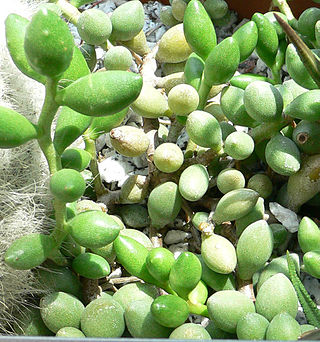
Adromischus is a genus of flowering plants. They are easily-propagated, leaf succulents from the family Crassulaceae, which are endemic to southern Africa. The name comes from the ancient Greek adros (=thick) and mischos (=stem).

Adromischus cristatus is a species of succulents from the family Crassulaceae, endemic to the eastern cape of South Africa. It is a perennial with short erect branches 20–50 mm long covered with fine aerial roots. Leaves are green to gray-green, with undulating margin, and generally measuring 20–40 × 5–13 mm. During the springtime, it sends up long narrow stalks for its flowers, which are tubular in shape and white in color with hints of red. Common names for this plant include "Key Lime Pie" and "Crinkle Leaf Plant."

Astroloba spiralis is a small succulent plant of the Astroloba genus, endemic to the southern Karoo regions of the Western and Eastern Cape Provinces, South Africa.

Gasteria bicolor is a species of succulent flowering plant in the family Asphodelaceae, native to the Eastern Cape, South Africa.

Cadaba aphylla ("Swartstorm") is one of the many species in the genus Cadaba. It is indigenous to southern Africa.

Drimia elata is a species of flowering plant in the family Asparagaceae, subfamily Scilloideae. It is widely distributed in eastern and southern Africa.
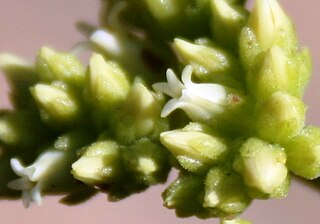
Crassula atropurpurea is a succulent plant, very common and widespread in the southern Karoo regions of South Africa and Namibia.

Crassula biplanata is a succulent plant native to rocky ledges and mountainous areas in the southern parts of South Africa.

Macledium spinosum is a variable species of flowering plant in the family Asteraceae, that is endemic to the southern Cape regions of South Africa.
Pteronia glauca ("Geelboegoekaroo") is a species of flowering plant in the family Asteraceae, indigenous to the Karoo regions of South Africa.
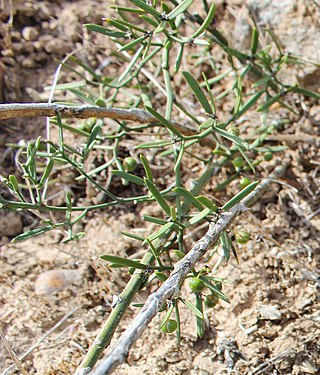
Asparagus striatus ("Bergappel") is a hard perennial shrublet of the Asparagus genus, that is indigenous to dry, rocky areas of South Africa.

Cephalophyllum purpureo-album is a plant species in the family Aizoaceae, endemic to the Western Cape Province, South Africa.

Cephalophyllum subulatoides is a plant species in the family Aizoaceae, endemic to the eastern parts of the Western Cape Province, South Africa.
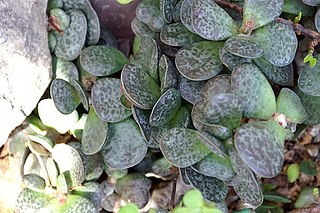
Adromischus maculatus, the spotted adromischus or calico hearts, is a species of flowering plant in the family Crassulaceae, which is endemic to the Eastern Cape and Western Cape of South Africa.

Babiana virescens is a species of flowering plant from the family Iridaceae.
Acrodon deminutus, also known as the Malgas tiptoothfig, is a species of mesemb from South Africa.

Adromischus alstonii is a species of succulent plant from the family Crassulaceae. The species name is the namesake of Edward Garwood Alston, who was a plant enthusiast from Cape Province, South Africa. A. alstonii is endemic to the Succulent Karoo in the Northern Cape, South Africa.
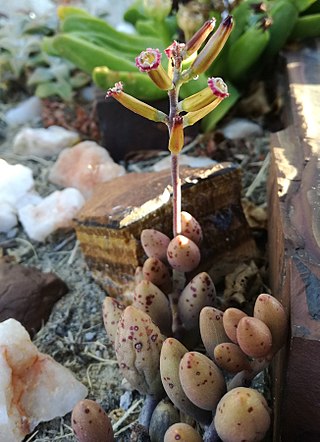
Adromischus filicaulis is a perennial, succulent plant in the family Crassulaceae. It is commonly called brosplakkies in Afrikaans. The species is endemic to South Africa and Namibia.
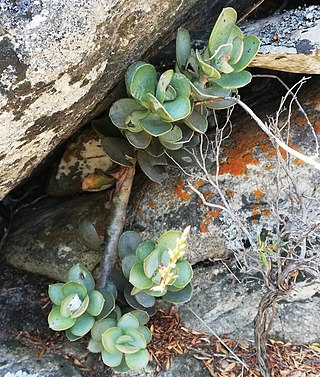
Adromischus hemisphaericus is a perennial, succulent plant in the Crassulaceae family. It is commonly called Brosplakkies. The species is endemic to the Western Cape, South Africa.
Lachenalia variegata, also known as the spotty viooltjie, is a species of plant from the Western Cape of South Africa.


















